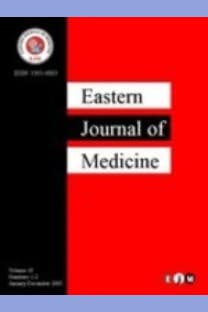The Analysis of The Relationship Between The Cultural Intelligence and The Feeling of Compassion In The Health Staff
The Analysis of The Relationship Between The Cultural Intelligence and The Feeling of Compassion In The Health Staff
___
- 1. Akdeniz S, Deniz ME. The Turkish adaptation of the Compassion Scale: A validity and reliability study. The Journal of Happiness & Well-Being 2016;4(1), 50-61.
- 2. Pommier, EA. The compassion scale. Dissertation Abstracts International Section A: Humanities and Social Sciences 2011;72, 1174.
- 3. Uğurlu AK, Eti Aslan F, Compassion and Nursing: Can Compassion be Measured? Review, Turkiye Klinikleri J Nurs Sci 2017;9(3):233-8.
- 4. Burnell L, Agan DL, Compassionate Care: Can it be Defined and Measured? The Development of the Compassionate Care Assessment Tool, International Journal of Caring Sciences 2013;6 (2), 180-187.
- 5. Ang SLV, Dyne C, Koh KY, Ng, KJ, Templer, CT, Chandrasekar NA. Cultural Intelligence: Its Measurement and Effects on Cultural Judgment and Decision Making, Cultural Adaptation and Task Performance. Management and Organization Review 2007;3 (3), 337-338.
- 6. Griffer, MR. Perlis SM. Developing Cultural Intelligence in Preservice Speech-Language Pathologists and Educators. Communication Disorders Quarterly 2007;29 (1), 28-29.
- 7. İşçi E, Söylemez Ö, Kaptanoğlu AY. A Research Conducted to Determıne Cultural Intellıgence Level in Hospıtal Management. Kafkas University Journal of Economics and Administrative Sciences Faculty 2013;5 1-18.
- 8. Crowne, KA, Phatak AV, Salunkhe U, Shivarajan S. Exploring Intelligences, Organizational Skills and Leadership in Mumbai, India, International Journal of Business, Humanities and Technology. 2011;1(2), 45-47
- 9. DiStefano, JJ, Maznevski, ML. Global Leaders are Team Players: Developing Global Leaders Through Membershıp on Global Teams. Human Resource Management, 2000;39 (2 ;3), 195–208.
- 10. Tan, JS. Issues & observations: cultural intelligence and the global economy. Leadership in Action, 2004;24 (5), 19-21.
- 11. Çetin ÇK. Cultural Intellıgence: A Research on Master Marıners and Chıef Offıcers. Gazi University Journal of Economics and Administrative Sciences. 2014;16(2): 134-155.
- 12. İlhan M, Çetin B, Validity and Reliability Study of the Turkish Version of the Cultural Intelligence Scale, Hacettepe University Journal of Education. 2014;29(2), 94-114.
- 13. Büyüköztürk Ş. Manual of data analysis for social sciences, Ankara, Pegem Akademi Publishing, 2007;1-20.
- 14. Pallant, J. SPSS survival manual: A step by step guide to data analysis using SPSS for windows. Australia, McGraw-Hill Education, 2005;1-58.
- 15. Tezbaşaran AA. Likert type scale development guide. Ankara. Turkish Psychologists Association Publications 1997; 12: 22-25.
- 16. Ergün G, Güzel A, Evaluation of Cultural Intelligence Levels of Female University Students According to Negative Automatic Thoughts and Some Other Variables, Gümüşhane University Journal Of Health Sciences 2017; 6(4): 30-43.
- 17. Kahraman M. Cultural Intellıgence in Foreign Language, Journal of Research in Education and Teaching 2016; 5(2): 12-18.
- 18. Rahimaghaee F, Mozdbar R, Cultural intelligence and its relation with professional competency in nurses. Nursing Practice Today 2017; 4(3):115-124.
- 19. Peterson B. Cultural intelligence, a guide to working with people from other cultures. USA: Intercultural Press 2004;10-98.
- 20. Thomas DC, Inkson K. People skills for a global workplace. Consulting to management 2005; 16(1): 1-5.
- 21. Brislin R, Worthley R, Macnab B. Cultural intelligence understanding behaviors that serve people’s goals. Group & Organization Management 2006;31(1), 40-55.
- 22. Du PY. Cultural intelligence as managerial competence. Alternation 2011;18(1), 28-46.
- 23. Christiansen A, O’Brien MR, Kirton JA, Zubairu K, Bray L. Delivering compassionate care: the enablers and barriers. Br J Nurs 2015; 24(16):833-7.
- 24. Cross CP, Brown GR, Morgan TJ, Laland KN. Sex differences in confidence influence patterns of conformity. British Journal of Psychology 2016; 12-25.
- 25. Jauk E, Freudenthaler HH, Neubauer AC. The dark triad and trait versus ability emotional intelligence. Journal of Individual Differences 2016; 37: 112-118.
- 26. Pardeller S, Frajo-Apor B, Kemmler G, Hofer A. Emotional intelligence, and cognitive abilities–associations and sex differences. Psychol Health Med 2017; 22(8): 1001–1010.
- 27. Nas E, Sak R. Compassion and Compassion-Focused Therapy Celal Bayar University Journal of Social Sciences 2020; 18 (1); 64-84
- 28. Genç MF, The Role of the Mercy Education in Reducing Aggressive Behavior, Ondokuz Mayıs University Review of the Faculty of Divinity OMUIFD, December 2018, 45: 61-82
- 29. Ezzatabadi MR, Bahrami MA, Hadizadeh F, Arab M, Nasiri S, Amiresmaili, Tehrani GA. Nurses' emotional intelligence impact on the quality of hospital services. Iranian Red Crescent Medical Journal 2012:14(12), 758-63.
- 30. Bogilović S, Škerlavaj M. Metacogonitive and motivational cultural intelligence: Superpowers for creativity a culturally diverse environment. Economic and Business Review 2016; 18(1): 55-76.
- 31. Ott DL, Michailova S. Cultural Intelligence: A Review and New Research Avenues. International Journal of Management Reviews 2016; 1–21.
- ISSN: 1301-0883
- Yayın Aralığı: 4
- Başlangıç: 1996
- Yayıncı: ERBİL KARAMAN
Frostbite – From Turkish Eastern Border As A Consequence Of Irregular Migration
Sebahattin ÇELİK, Servet Elçin ALPAT, Selin BULUT, Hakan KÖKSAL
X-ray Exposure Reduces the Number of Hippocampal Pyramidal Neurons in Offspring Rats
Ayşegul BESTEL, Aybeniz Civan KAHVE, Merve Aldıkaçtıoğlu TALMAÇ, Pinar Yalçın BAHAT, Zübeyde AYTUFAN, İbrahim POLAT, İsmail ÖZDEMİR
Ramazan Sami AKTAŞ, Polat DURUKAN
Şükriye İlkay GÜNER, Selver KARAASLAN, Savaş GÜNER, Reyhan ORHUN, Gül ULAY
Mustafa TUNCER, Fatih ÖZTÜRK, Rabia ÇOLDUR, Medeni KARADUMAN, Yılmaz GÜNEŞ
Relationship between SUVmax in F-18 FDG PET/CT and serum YKL-40 levels in Breast Cancer
Ebru Orsal İBİŞOĞLU, Arif Kürşat AYAN, Zeynep AKAR, Engin ŞEBİN
Buket Mermit ÇİLİNGİR, Selami EKİN, Hanifi YILIDIZ, Aysel SÜNNETÇİOĞLU, Hülya GÜBATAR
Başak Kuşakcı ŞEKER, Tuğba KAVALCI, Melike Demirayak AKDEMİR, Hakan ÖZDEMİR
